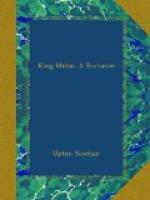“Where is he now?” she asked, hastily.
“Oh, he has gone home,” said Helen; and she added, smiling, “he went on Saturday afternoon, because he’s writing a poem about thunderstorms, and he wanted to study that one.”
The other was sufficiently convinced of the irresponsibility of poets to be half uncertain whether Helen was joking or not; it was very frequently difficult to tell, anyway, for Helen would look serious and amuse herself by watching another person’s mystification—a trait of character which would have been intolerable in anyone less fascinating than she.
Perhaps Aunt Polly thought something of that as she sat and watched the girl. Aunt Polly was a little woman who looked as if she herself might have once made some pretense to being a belle, but she was very humble before Helen. “My dear,” she said, “every minute that I watch you, I am astonished to see how wonderfully you have grown. Do you know, Helen, you are glorious!”
“Yes,” said Helen, smiling delightedly. “Isn’t it nice, Aunt Polly? I’m so glad I’m beautiful.”
“You funny child,” laughed the other. “What a queer thing to say!”
“Am I not to know I am beautiful?” inquired Helen, looking at her with open eyes. “Why, dear me! I can look at myself in the glass and be just as happy as anyone else; I love everything beautiful.”
Aunt Polly beamed upon her. “I am glad of it, my dear,” she laughed. “I only wish I could say something to you to make you realize what your wonderful beauty means.”
“How, Aunt Polly?” asked the girl. “Have you been reading poetry?”
“No,” said the other, “not exactly; but you know very well in your heart what hopes I have for you, Helen, and I only wish you could appreciate the gift that has been given you, and not fling it away in any foolish fashion. With your talents and your education, my dear, there is almost nothing that you might not do.”
“Yes,” said Helen, with all of her seriousness, “I often think of it; perhaps, Auntie, I might become a poetess!”
The other looked aghast. Helen had seen the look on her aunt’s face at the mention of her walk with Arthur, and being a young lady of electrical wit, had understood just what it meant, and just how the rest of the conversation was intended to bear upon the matter; with that advantage she was quite in her glory.
“No, indeed, Aunt Polly,” she said, “you can never tell; just suppose, for instance, I were to fall in love with and marry a man of wonderful genius, who would help me to devote myself to art? It would not make any difference, you know, if he were poor—we could struggle and help each other. And oh, I tell you, if I were to meet such a man, and to know that he loved me truly, and to have proof that he could remember me and be true to me, even when I was far away, oh, I tell you, nothing could ever keep me—”
Helen was declaiming her glowing speech with real fervor, her hands dramatically outstretched. But she could not get any further, for the look of utter horror upon her auditor’s face was too much for her; she dropped her hands and made the air echo with her laughter.




